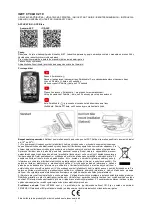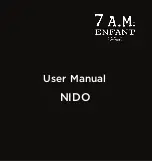FXTH870xD
Sensors
Freescale Semiconductor, Inc.
95
12.7
Auto-Zero Sequence
An auto-zero sequence is performed periodically on the input amplifier to cancel offset errors. During reception of the SYNC
pattern and body of the message, auto-zero operations are synchronized to data edges of the incoming signal to avoid interfering
with normal reception. During the auto-zero sequence, the input amplifier is temporarily disconnected from the external coil and
connected to ground. The auto-zero sequence takes roughly 64
sec. It is performed at each LFO period in carrier mode and on
one over four decoded data edges in data mode.
When the DECEN bit is cleared, the auto-zero sequence is performed at each LFO period. During the 64
sec of the auto-zero
sequence, the receiver is holding the state “0” or “1”' previously decoded. Since the LFR receiver is not active during this time,
the possible data-rate that the analog can detect is at least limited by this duration.
12.8
Data Recovery
Rectified signals from the amplifier output are connected to the input of an averaging filter and data slicer. The slicer thus
compares the rectified signal with its own average value to decode the data. When a carrier is present, the slicer output voltage
rises and when the carrier stops the slicer output voltage falls. The output of this comparator provides a binary digital signal that
indicates whether the carrier is present or not. This digital signal is connected to the data clock recovery circuit, the SYNC detect
circuit, and the Manchester decoder circuit.
The Manchester decoder uses the digital output of the data slicer to detect the logic level of each incoming data bit and to
synchronize the decoder state machine. The LFPOL polarity bit in the LFCTRLA register selects the expected encoding of the
Manchester data bit.
If a strong signal (above roughly 100 mV p-p differential) is entered into the LFR, the input impedance will switch instantaneously
to a lower programmed value (the LOWQ[1:0] bits in the LFCTRLC) and be maintained during the current data packet if the
DEQEN bit is set. At the next ON time, the default high input impedance will be set again. The strong signal detection and the
automatic impedance change can be disabled by clearing the DEQEN bit.
12.9
Data Clock Recovery and Synchronization
Data clock recovery and synchronization takes place during the SYNC portion of an incoming message. The preamble must be
modulated Manchester data. The type of required SYNC pattern determines the allowed preamble type depending on the
SYNC[1:0] control bits.
The design data rate is 3.906 kbps which gives a bit time equivalent to about 32 cycles of the LF carrier frequency. In a
Manchester encoded bit time, the carrier should be present for either the first half or the second half of the bit time depending on
whether the bit is a logic zero or a logic one.
The LFRO clock source is 32 times the target data rate. The LFRO is used for decoding data and also sequencing auto-zero
operations.
12.10
Manchester Decode
When the LFPOL bit is clear, a logic one bit is defined as no LF carrier present for the first half of the bit time; and a logic zero
bit is defined as LF carrier present for the first half of the bit time as shown in
Figure 67
. Another way to say this from the point
of view of the data slicer output is that a logic zero bit has a falling edge at the middle of the bit time and a logic one bit has a
rising edge at the middle of the bit time. The data slicer threshold is dynamically adjusted to the midpoint between the carrier-
present and no-carrier levels at the summing node for the rectified output of the LF input amplifier.
Summary of Contents for FXTH870 D Series
Page 86: ...FXTH870xD Sensors 84 Freescale Semiconductor Inc Figure 57 Data Flow For Measurements...
Page 171: ...FXTH870xD Sensors Freescale Semiconductor Inc 169 Figure 128 QFN Case Outline...
Page 172: ...FXTH870xD Sensors 170 Freescale Semiconductor Inc Figure 129 QFN Case Outline...
Page 173: ...FXTH870xD Sensors Freescale Semiconductor Inc 171...


















